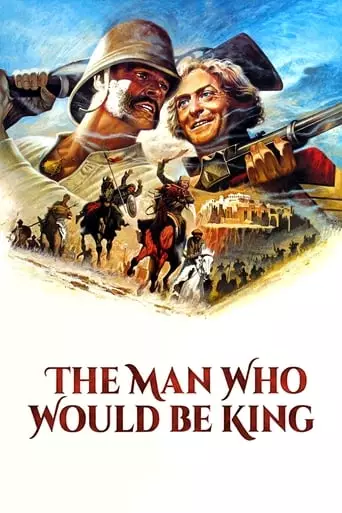
The Man Who Would Be King (1975) Watch Online Free
A robust adventure about two British adventurers who take over primitive Kafiristan as “godlike” rulers, meeting a tragic end through their desire for a native girl. Based on a short story by Rudyard Kipling.
The Man Who Would Be King is based on Rudyard Kipling’s 1888 novella of the same name. The story is set in the late 19th century and follows two British adventurers, Daniel Dravot (Sean Connery) and Peachey Carnehan (Michael Caine), who, after being former soldiers in the British Army, seek to carve out their own kingdom in a remote region of Afghanistan called Kafiristan. Their plan is to use their military experience and modern weaponry to gain the trust of the local tribespeople and establish themselves as rulers. However, their ambitious journey takes an unexpected turn when Dravot, once revered as a god by the locals, meets a tragic downfall. The film is framed by a conversation between Peachey and the narrator, a journalist played by Christopher Plummer, who is intrigued by their incredible story.
The film is both an adventure and a tragic tale about the destructive nature of unchecked ambition and the dangers of colonial arrogance. Director John Huston’s adaptation of Kipling’s novella explores themes of power, friendship, loyalty, and identity. The movie reflects on the consequences of Western imperialism through its protagonists, who believe that they can conquer and control a foreign land simply because of their European heritage and military training.
The dynamic between Connery and Caine is central to the film, with their performances bringing depth to the characters. The chemistry between the two leads portrays their shared dream of glory, but also their personal struggles with pride and morality. The character of Dravot is a complex one—his belief in his divine destiny ultimately leads to his downfall, while Peachey is more cynical, but also deeply loyal.
Huston’s direction emphasizes the visual grandeur of the rugged Afghan mountains, using them as a backdrop to the unfolding drama. The film’s pacing alternates between moments of high adventure, such as battles and close calls, and the deepening unraveling of the characters’ fates.
After watching The Man Who Would Be King, you might feel a deep sense of reflection. The film’s exploration of ambition and human folly is thought-provoking. The tragic end of the characters will likely leave you feeling somber, but also satisfied with the depth of the film’s themes. You might find yourself contemplating the cost of power and the consequences of arrogance, especially in the context of historical imperialism. It is a film that challenges its viewers to reflect on the nature of friendship, loyalty, and the danger of viewing oneself as invincible.
The combination of action, humor, and tragedy ensures that The Man Who Would Be King is not just a film about adventure, but a commentary on the human condition, leaving you with a mix of awe and introspection.
